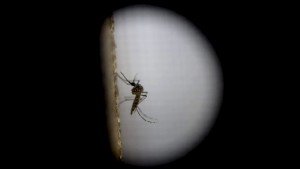
St. John Jamaica Trains Volunteers on Zika Virus: What is Certain, and What is Not
February 13th, 2016
Has the Zika Virus been with us all along? This was the question that turned itself over and over in my mind, as I sat in on a training session for St. John Ambulance volunteers at their Kingston headquarters last week. Dr. Garth Officer seems to be of that opinion. The virus “is not new,” he asserted. “The Portmore case did not come as a surprise to some of us…We should have been already prepared.”
St. John has embarked on a series of Zika Virus training sessions across the island, with the aim of getting volunteers to conduct community health education and awareness sessions within the communities where they live and work, in collaboration with local health authorities. In the future, St. John has plans to work more closely with the Jamaican Ministry of Health and to extend its public awareness program on the Zika Virus across the Caribbean – including guidance and information for mothers and children in light of concerns about a possible link with microcephaly. This forms part of St. John’s quite ambitious training schedule for its volunteers and members this year.

A signpost leading to Zika forest in Uganda, January 29. The Zika virus was first discovered in the forest in 1947, but there have been very few confirmed cases locally in recent years.
ISAAC KASAMANI/AFP/GETTY IMAGES
Indeed, Zika has been around for quite a while – since 1947, when it was found in Uganda in a Rhesus monkey. It is named after the Zika Forest. There have been very few cases there in recent years, suggesting that the population may be immune; in fact, the only cases in Africa during the recent outbreak have been in the Cape Verde Islands, and not on the mainland. During the 1970s and 1980s, Zika spread across much of Asia, and in 2013/14 to some Pacific Islands. And so to the Americas, where deep concerns have arisen over the possible microcephaly connection (we are now all too familiar with that medical term, aren’t we).
Dr. Officer gave a clear and succinct presentation. He emphasized to the trainees that the link between the Zika Virus and microcephaly in newborns has yet to be firmly established. He also stressed that pregnant women are not more susceptible than others to the virus, but it can be caught at any stage of pregnancy. Whether you are pregnant or not, if you do have the virus you need to avoid getting bitten by mosquitoes during the first week, as any mosquito that bites you then can pass it on. You must also have a blood test done within the first eight days of symptoms.
Dr. Officer has decades of experience in tropical medicine, including in South East Asia. He has always found it a fascinating field, he told me, simply because of its uncertain nature. Not all fevers are alike; and the symptoms of Zika virus are the same as those for many other mosquito-borne diseases, such as dengue, chikungunya and malaria. There are major differences between viral and bacterial diseases; bacterial diseases can only be treated with antibiotics. Then there is a suspected link (not confirmed) between Zika and the Guillain-Barré Syndrome, a disorder of the immune system that affects the nervous system; six countries have experienced an increase in the syndrome (Brazil, French Polynesia, El Salvador, Venezuela, Colombia and Suriname) during the current outbreak. The syndrome is certainly one of those mysterious tropical ailments for which there is no known cure, but it can be triggered by viral or bacterial infections and it can also manifest itself in different forms. At present though, as with microcephaly, there is no scientific evidence to prove the link.
In the case of Zika and similar viruses, Dr. Officer advised that one should not take aspirin or non-steroidal anti inflammatory drugs such as ibuprofen and naproxen. Safer alternative painkillers are acetaminophen or paracetamol.
The body must not be under stress if affected by the virus, Dr. Officer pointed out. Dehydration can raise stress levels and can have a dangerous impact on one’s health altogether. As we should do at all times in our tropical environment, we should drink plenty of fluids (water).

The Aedes aegypti mosquito, responsible for the spread of the dengue and Zika viruses, during testing at the Roosevelt Hospital in Guatemala City. Photo: Bloomberg
There may even be different strains of the Zika Virus, the doctor added. “It’s very deceitful,” he observed wryly. He also reminded trainees that there are two species of mosquito that carry disease: aedes egypti and its “cousin” aedes albopictus. The latter (the “Asian tiger” yes, it’s stripy too) is native to southeast Asia but has extended its range to parts of the Americas.
With the plethora of reports, updates and theories circulating daily online, perhaps this tricky virus is deceiving us (and we are often confused). One thing we can do, however, is arm ourselves with the known facts about Zika, and act accordingly.
Now, I think the St. John volunteers are well armed. The training is ongoing.
For more information on the work of St. John Jamaica, contact: Alison Christie Binger, Executive Director. Tel: 926-7656 or 906-1458
email: edst.johnjamaica@gmail.com Facebook: www.facebook.com/stjab Twitter: @stjohnjamaica
Tags: aedes albopictus, aedes egypti, Caribbean, chikungunya, dengue fever, Dr Garth Officer, Guillain-Barre Syndrome, Kingston, malaria, microcephaly, mosquito-borne disease, pregnancy, St. John Jamaica, training, Uganda, Zika virus
The Gleaner reserves the right not to publish comments that may be deemed libelous, derogatory or indecent.
To respond to The Gleaner please use the feedback form.
- We Are the Zoomers
- Living Online with Humans and Birds: NAOC 2020
- Human Trafficking and the Problem of Public Education
- Down Memory Lane
- Are We Ready to Recover from COVID-19?
- Road Safety Matters: Is Your Vehicle Safe?
- Sexual Harassment, Me Too, and the Minister’s Disturbing Giggle
- The Vulnerable Senior Citizens, Private Care Homes and COVID-19
- A Muddle Over Masks
- Here is Something Life-Saving You Can Do: Give Blood!



